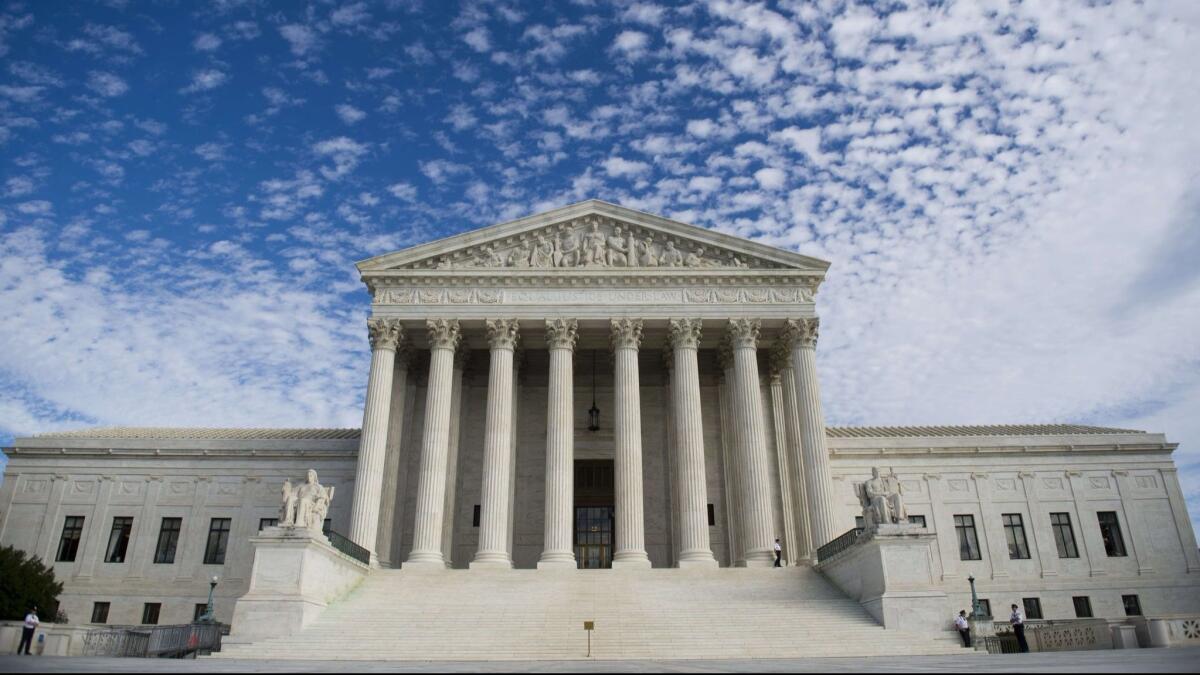Supreme Court to decide whether immigrants jailed for past crimes can be detained pending deportation

- Share via
Reporting from Washington — The Supreme Court agreed Monday to decide another case testing the Trump administration’s power to arrest and jail immigrants facing deportation, including longtime lawful residents who committed minor offenses years ago.
The justices will review a class-action ruling from California that held that immigrants who were released after serving time in local and state jails may not be detained later by federal immigration agents for possible deportation and held indefinitely without a hearing, if they pose no danger to the public and are not likely to flee.
Administration lawyers appealed the ruling of the U.S. 9th Circuit Court of Appeals, arguing that federal law calls for “mandatory detention” for all noncitizens who face possible deportation because of a criminal record.
They said the 9th Circuit’s approach would lead to a “gap in custody” and “frustrate the [government’s] ability to remove deportable criminal aliens from the United States.” And they placed part of the blame on “state and local jurisdictions [that] do not always cooperate” with federal efforts to arrest immigrants who are leaving jails.
The case, to be heard in the fall, sets up another clash between “sanctuary” cities and counties and federal immigration agents who seek to detain and deport immigrants who have criminal records.
In deciding the case, the 9th Circuit said that more 30,000 non-citizens are held every day in the United States in “prison-like conditions” while they challenge the government’s efforts to deport them. The judges said the mandatory-detention rule covers those with a “broad range of crimes” on their records, from violent felonies to simple drug possession. And it applies to longtime, lawful residents who have lived and worked in the United States for decades, they said.
The lead plaintiff in the challenge to this provision, Mony Preap, was born in a Cambodian refugee camp and has been a lawful permanent resident since 1981. He was convicted on two counts of marijuana possession in 2006, a misdemeanor offense. Agents of the Department of Homeland Security took him into custody in 2013 under the disputed part of the immigration law, which says the DHS “shall take into custody any alien” who was convicted of a “deportable” offense “when the alien is released.”
Preap joined a class-action suit brought by the American Civil Liberties Union to challenge the government’s view that he was subject to mandatory detention seven years after his release. A federal judge in San Francisco and the 9th Circuit agreed with the challengers and said the phrase “when the alien is released” referred only to the time of their release. Because Preap had been released years earlier, he was not subject to mandatory detention in 2013 for the past offenses, the appeals court said.
“We therefore hold that the mandatory detention provision … applies only to those criminal aliens who are detained promptly after their release from criminal custody, not to those detained long after,” wrote Judge Jacqueline Nguyen.
The Supreme Court kept the government’s appeal on hold while it decided a related case. In Jennings vs. Rodriguez, the court ruled last month that federal law did not give jailed immigrants a right to a bail hearing after six months in custody. However, the justices sent that case back to the 9th Circuit to rule on whether indefinite detention without a hearing violated the Constitution.
The new case, Nielsen vs. Preap, concerns a part of the same immigration law but focuses on a different group of lawful immigrants who had served jail time for a criminal offense.
Lawyers for Preap and the other plaintiffs in the case had urged the court to turn down the administration’s appeal. “Instead of focusing mandatory detention on high-risk individuals who are coming out of criminal custody, the government’s expansive interpretation would sweep up individuals who have been living peaceably in the community for more than a decade and pose neither a danger nor a flight risk,” they said.
They cited a second plaintiff, Eduardo Vega Padilla, who came to the United States as a toddler and has been a lawful permanent resident since 1966. He was convicted of drug possession in 1997 and for keeping an unloaded pistol in a shed behind his house. He served six months in jail, but was arrested 11 years later under the mandatory-detention provision of the federal law. Padilla was later released on bond because he posed no flight risk.
Preap was released after winning his fight against deportation.
But the Supreme Court said it would hear the case of Neilsen vs. Preap in the fall to decide whether federal law requires mandatory detention for all non-citizens who have past crimes that could trigger their deportation.
Major questions before the Supreme Court this year »
Twitter: DavidGSavage
UPDATES:
1:05 p.m.: The article was updated throughout with additional details and background.
The article was originally published at 8:30 a.m.
More to Read
Get the L.A. Times Politics newsletter
Deeply reported insights into legislation, politics and policy from Sacramento, Washington and beyond. In your inbox twice per week.
You may occasionally receive promotional content from the Los Angeles Times.











